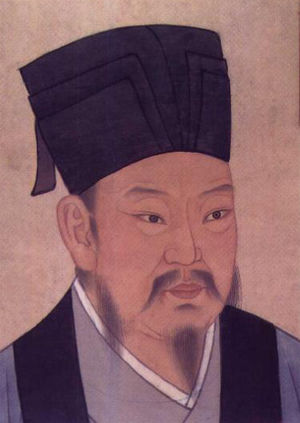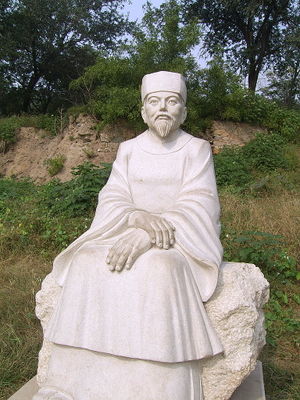Archive:Ko Wan
 | This article or section is out of date. A country/countries relevant to this article have been removed from Sahar and have been retconned. Not everything here may still be considered canonical. This page was last edited by Protondonor (talk | contribs) 2 years ago. (Update) |
- This is a Hux Kham name; the honorific name is U, and the family name is Ko.
| U Ko Wan-Thang | |
|---|---|
 A drawing of Ko Wan-Thang | |
| Born | Ko Wan 1161 Khin Mlak, Hux Kham |
| Died | Khin Mlak, Hux Kham |
| Nationality | Kingdom of Hux Kham |
| Other names | 1233 |
| Occupation | philosopher, educator |
| Known for | tathangism |
| Notable work | Zeh-lu Tro(actually written by his disciples) |
U Ko Wan(1161-1233), also known as U Ko Wan-Thang(Qonklese: 成浩然), was a philosopher of Hux Kham, notable for being the founder of tathangism, a philosophical belief that has profoundly influenced Hux Kham people. He was posthumously entitled as U Ta Ze(Qonklese: 正道先生, literally "Mr. Right Knowledge") by his disciples and his thoughts are recorded in the book Zeh-lu Tro by his disciples collectively.
He was officially entitled as a saint of Hux Kham posthumously by the king, and was the only saint of Hux Kham besides the deities and the kings during the dynasty times, and is still the only publicly accepted saint besides the traditional deities of Hux Kham people nowadays.
Life
Ko Wan was born in an upper class family in Khin Mlak, it is not clear if he was a from Nkin family or from a wealthy commoner family, but from the fact that he was well-educated, he was very likely to have a high origin, as literacy was highly limited and only people of a high origin at that time could have a chance to receive education at that time in Hux Kham.
Not much about his childhood is known, but it is believed that he was educated in Hux Kham and was chosen by the king Truk-klat, the king of Hux Kham as that time, as a student to study abroad in Qonklaks when he was 16, and he learnt reading and writing in Qonklaks and philosophy of Qonklaks there, and he went back to Hux Kham as a scholar when he was 35, and was used by the government as an official at the time he returned Hux Kham.
After going back to Hux Kham, he became an interpreter and a teacher for the court, and he also start to teach Qonklese philosophy to the king and aristocrats in Hux Kham, and he also started to develop his own philosophical view towards the life, ethics, politics, etc., and his philosophical view would later be known collectively as tathangism and became the most philosophy of the culture of Hux Kham.
However, during the time serving for the king, Ko Wan also attracted the jealousy and hate from other officials, especially certain bureaucrats in the court at that time because of his ability and integrity, and people who hated him made a lot of rumors about him around the king, so in 1211, he was removed from his position by the king, so he started to become a full-time teacher, teaching Hux Kham people from all social classes about his philosophical view, because of his knowledge and moral integrity, he soon attracted many students for him, and eventually he became one of the most famous teacher and philosopher in Hux Kham; however, when he was alive, his philosophy was often attacked by his haters, and his disciples often tried to advocate for him, and some of the debates could be seen in the book of Zeh-lu Tro.
Ko Wan eventually died of disease in 1233, and after his death, he was given a posthumous name U Ta Ze by his disciples. Despite being literate and having helped the creation of Hux Kham Thwing Hlak(Qonklese: 湖國春秋), the first chronicle of Hux Kham written in Qonklese, and several other official records, Ko Wan did not write any book on his own philosophical views when he was alive, and his teachings and thoughts were recorded by his students collectively in the book Zeh-lu Tro.
Trivia
- Being deeply influenced by Qonklese culture, Ko Wan always wore in a Qonklese style, which deeply influenced the fashion of the upper class in Hux Kham for several centuries until Hux Kham became a republic in 1848.
